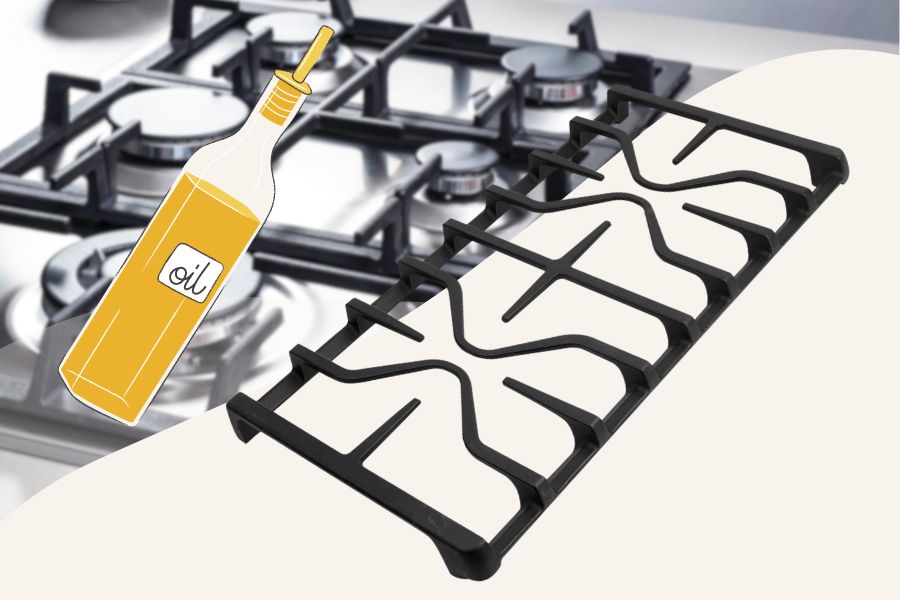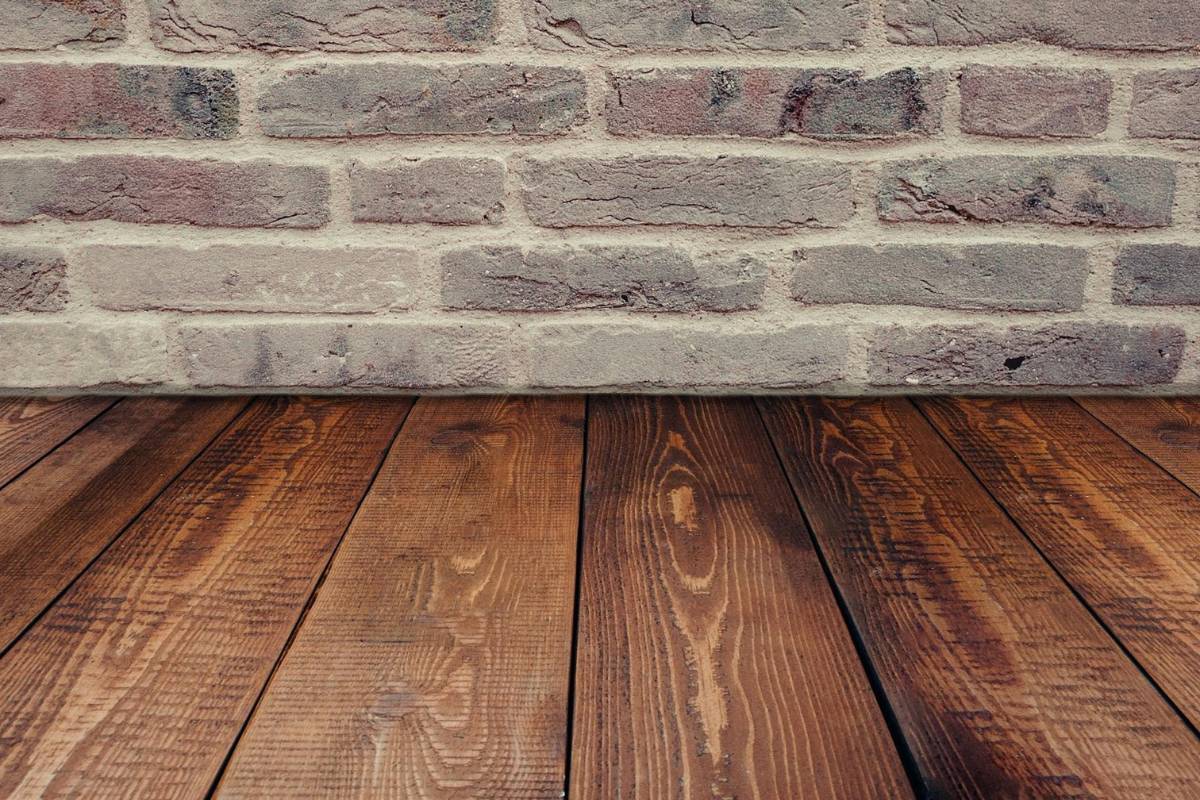Cast iron grates on gas stoves are a durable and long-lasting option for cooking, but they require proper maintenance to perform their best. One important maintenance aspect is seasoning the grates, which helps protect them from rust and damage and improves their non-stick properties.
This blog post will explore the importance of seasoning cast iron grates on gas stoves and provide step-by-step instructions for a successful process. Whether you are a seasoned cook or just starting, following these tips and tricks will help ensure that your grates are always in top condition.
Here is a quick answer to the main question, “How to season cast iron grill grates,” just in case you don’t want to read longer.
To season cast iron grill grates, clean them with hot water and soap, dry them thoroughly, apply a thin coat of oil, and heat them over medium heat until the oil is smoking. Let the grates cool completely before storing.
What Is Seasoning?
Seasoning refers to applying a thin layer of oil to the surface of cast iron grates and heating it to a high temperature. This process creates a protective barrier that prevents rust and deterioration and helps improve the grates’ non-stick properties.
Seasoning is important in caring for and maintaining cast iron grates on a gas stove. By properly seasoning the grates, you can ensure that they perform at their best and last many years.
Importance of Seasoning Stove Grates
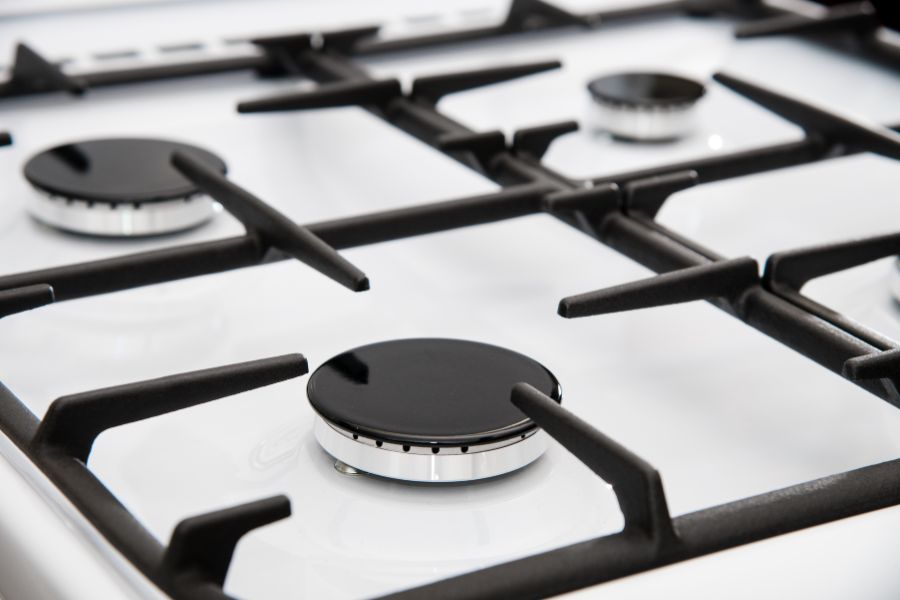
Seasoning cast iron grates is critical to their maintenance and helps protect, preserve, and improve their performance. By following the proper steps and techniques, you can ensure that your grates are always in top condition and ready to use whenever you need them.
The importance of seasoning cast iron grates on a gas stove can be summarized as follows:
- Protects Against Rust: Seasoning creates a protective layer on the grates that prevents rust formation and extends the life of the grates.
- Improves Non-stick Properties: A well-seasoned cast iron grate will have a naturally non-stick surface, making cooking and cleaning easier.
- Enhances Flavor: Seasoning can add flavor to your food by creating a slightly seasoned surface for cooking.
- Increases Durability: Regular seasoning helps maintain the grates’ integrity and prevents damage from use and exposure to moisture.
- Easy Maintenance: Seasoning helps keep the grates clean and in good condition, reducing maintenance over time.
Preparing the Grates for Seasoning
Before seasoning your cast iron grates, it is important to prepare them properly to ensure a successful outcome. Here is what you need to know about preparing the grates for seasoning:
Cleaning the Grates
- Remove the grates from the stove and wash them thoroughly with hot, soapy water.
- Use a wire brush to scrub away loose or burned food and debris.
- Dry the grates completely with a clean cloth or paper towel.
Tools and Materials
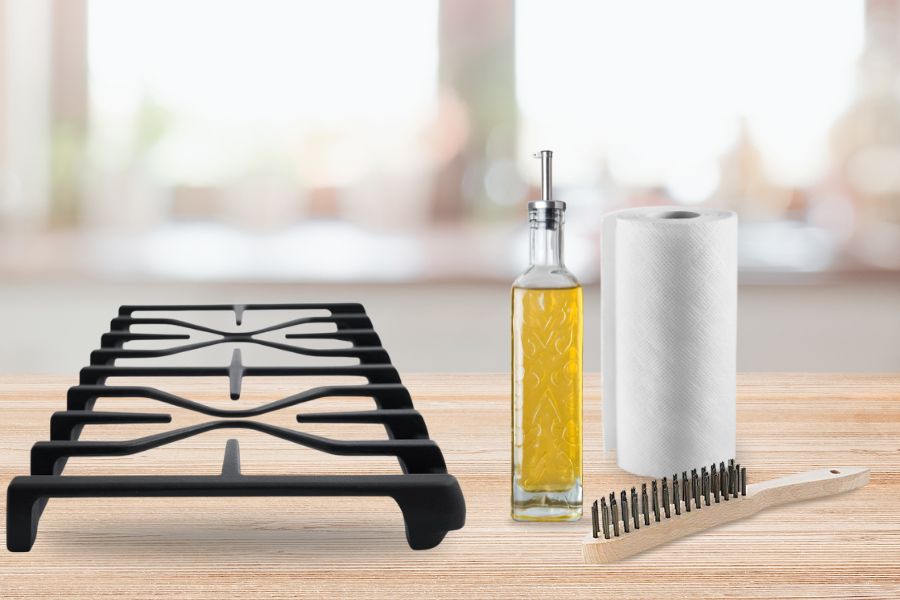
- You will need a wire brush, vegetable oil, and a clean cloth or paper towel.
- It is also helpful to have oven mitts and a baking sheet to handle the grates easily.
These steps will ensure that your grates are clean and ready for seasoning. This preparation is key to achieving a successful outcome and ensuring that the grates perform at their best.
The Seasoning Process
Seasoning your cast iron grates is a simple process that requires only a few tools and materials. Here are step-by-step instructions on how to season your grates:
Apply Oil to the Grates
- Use a clean cloth or paper towel to apply a thin, even layer of vegetable oil to the grates.
- Make sure that all surfaces of the grates are coated with oil, paying special attention to any cracks or crevices.
Heat the Grates
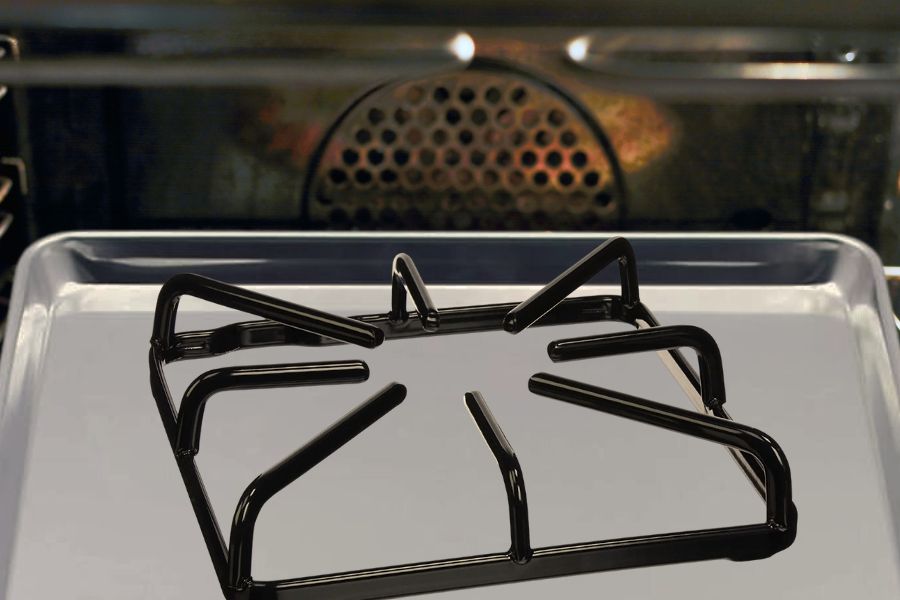
- Place the oiled grates on a baking sheet in an oven preheated oven to 375-450°F (190-230°C).
- Bake the grates for 1 hour.
- After 1 hour, turn off the oven and let the grates cool completely in the oven.
Repeat the Process
- Repeat the seasoning process 2-3 times to build a durable, protective layer on the grates.
- Each time you season the grates, the surface will become smoother and more non-stick.
Maintaining the Seasoning
- To maintain the seasoning on your grates, use a paper towel or cloth to wipe away any food residue after cooking.
- Avoid using soap or harsh scrubbers, as these can strip the seasoning.
- Re-season the grates every 2-3 uses or as needed.
By following these steps, you can effectively season your cast iron grates and ensure they perform at their best. Regular seasoning will also help to maintain the protective barrier and keep the grates in top condition.
Tips and Tricks for Successful Seasoning
Seasoning your cast iron grates is a straightforward process, but there are a few tips and tricks to keep in mind to ensure a successful outcome:
Use the Right Type of Oil
- Use a high smoke point oil, such as vegetable oil, to season your grates.
- Avoid using oils with a low smoke point, such as olive oil, as these can break down and become rancid at high temperatures.
Be Mindful of the Temperature
- The temperature for seasoning should be in the range of 375-450°F (190-230°C).
- If the temperature is too low, the grates may not season properly. The oil may break down and become rancid if the temperature is too high.
Avoid Over-Seasoning
- Too much oil can build up on the grates and become sticky or rancid, so be careful not to apply too much oil during the seasoning process.
- A thin, even layer of oil is needed to season the grates effectively.
Troubleshoot Uneven Seasoning
- If you notice that the grates are not seasoning evenly, try applying more oil to the areas that are not developing a protective layer.
- You can also try seasoning the grates for longer to build up a thicker layer of seasoning.
Prevent Rust
- Regular seasoning will help prevent rust, but storing the grates in a dry place is still important to minimize the risk of rust formation.
- If you notice rust on your grates, use a wire brush to remove them and re-season them.
These tips and tricks can ensure a successful outcome when seasoning your cast iron grates. With proper care and maintenance, your grates will last for many years and perform at their best.
FAQ
Do You Need to Season Cast Iron Grill Grates?
Yes, you need to season cast iron grill grates. Seasoning creates a barrier between the metal and food, which prevents rust and food from sticking. It also helps to improve the heat distribution of the grates.
Also Check: How to Season a Whirley Pop
More Gas Stove Maintenance and Care Guides:
- The gas stove glass top is broken.
- Gas stove grates too high.
- Can you paint gas stove grates?
- Can you put gas stove grates in the dishwasher?
Bottom Line
Seasoning your cast iron grates is an important step in maintaining the longevity and performance of your gas stove. Regularly seasoning the grates can improve their non-stick properties, prevent rust formation, and prolong their life.
The process of seasoning is simple, but it is important to prepare the grates properly, use the right type of oil, and be mindful of temperature and application. By following these steps and adhering to tips and tricks, you can achieve a successful outcome and enjoy the benefits of well-seasoned cast iron grates.
Don’t forget the benefits of regular seasoning, including improved cooking performance, a longer lifespan for your grates, and reduced risk of rust and other damage. With a little care and attention, your cast iron grates can be a reliable and valuable tool in your kitchen for many years.

